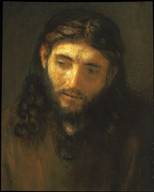Since Baroness Warsi recently re-ignited the debate about religion in public life, I've been following some of the correspondence in The Independent, and listening to speakers such as AC Grayling going head to head with Christina Rees (Chair of the House of Laity of the General Synod).
One of the current lines of argument of the secularists is to draw from a tradition of secular scepticism going back to the Greeks. They argue that there is 'nothing new under the sun', and indeed claim that very phrase from Greek philosophy as predating the same in Ecclesiastes in the Bible.
It strikes me that St Paul had something to say about this nearly 2000 years ago when he wrote to the Corinthian church: 'Jews demand miraculous signs and Greeks wisdom, but we preach Christ crucified.' 'Irrational religion' and 'irreligious rationalism' - they are both mistaken answers to the world's needs in Paul's view. Rather, the answer is to be found in 'Christ crucified, a stumbling'block to Jews and folly to the Greeks'.
Yes, the AC Graylings of the world would claim 'Christ crucified' to be folly, just as followers of Greek philosophy in the 1st century did. I believe this is the time for the church to be confident in preaching the same gospel as Paul: 'Christ crucified - Christ the power of God and the wisdom of God' because that way - the way of sacrifice and love, of death and resurrection - is where we can find power to change our lives.
Saturday, 18 February 2012
Monday, 6 February 2012
Just 10: You shall not steal
Yesterday, with reduced numbers because of the snow, we looked at the 8th Commandment - 'You shall not steal'. The reasons for not stealing are fairly obvious: to steal is dishonest, to steal spoils society by creating suspicion and fear, to steal robs us of better things - for example not paying taxes robs society of basic services, and to steal devalues honest work - "Why work if I can steal it?"
The story of Zacchaeus in Luke's Gospel shows how a life of cheating and stealing can be transformed. What made an impact on me as I prepared to speak on such a familiary story what the meaning of his name: 'Zacchaeus' is from the Hebrew meaning 'Pure'. I imagined Zacchaeus' parents choosing a name for him before he was born. There was a belief that a child's name would describe his character when he grew up; so what happened to Zacchaeus to make him so corrupt? Somewhere he broke the 10th Commandment - he began to covet, then the 8th - he began to steal by taking more in tax than was legal. But the good news is that when he encountered Jesus his life was transformed.
The people muttered that Jesus was going to eat in the house of a 'sinner'. But Zacchaeus wasn't just a sinner. Somewhere between being up the tree and coming down he became a sinner who was forgiven and saved, and his life was changed. And there is no more real change than paying back four times what you have stolen.
'You shall not steal': it's not just about burglary, but deception and fraud, office theft in the form of taking a 'sicky', tax evasion, robbing the future generation of natural resources by our profligate use of them now, robbing the poor of a fair price and wage for the goods we buy so cheaply. We might alol be complicit in these practices, just as Zacchaeus was in his day, but we can change just as he did.
The story of Zacchaeus in Luke's Gospel shows how a life of cheating and stealing can be transformed. What made an impact on me as I prepared to speak on such a familiary story what the meaning of his name: 'Zacchaeus' is from the Hebrew meaning 'Pure'. I imagined Zacchaeus' parents choosing a name for him before he was born. There was a belief that a child's name would describe his character when he grew up; so what happened to Zacchaeus to make him so corrupt? Somewhere he broke the 10th Commandment - he began to covet, then the 8th - he began to steal by taking more in tax than was legal. But the good news is that when he encountered Jesus his life was transformed.
The people muttered that Jesus was going to eat in the house of a 'sinner'. But Zacchaeus wasn't just a sinner. Somewhere between being up the tree and coming down he became a sinner who was forgiven and saved, and his life was changed. And there is no more real change than paying back four times what you have stolen.
'You shall not steal': it's not just about burglary, but deception and fraud, office theft in the form of taking a 'sicky', tax evasion, robbing the future generation of natural resources by our profligate use of them now, robbing the poor of a fair price and wage for the goods we buy so cheaply. We might alol be complicit in these practices, just as Zacchaeus was in his day, but we can change just as he did.
Subscribe to:
Posts (Atom)
